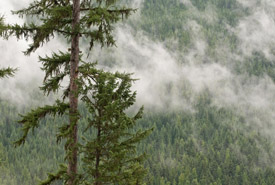Putting a price on nature

Misty Darkwoods forest, BC (Photo by Bruce Kirkby)
Sometimes it is only by putting a price on something that we truly begin to value its real worth and importance to us. This certainly applies to manufacturing goods and various services, but increasingly it is being applied to nature’s benefits. In fact, this is the idea behind the economic valuation of ecological goods and services (or EG&S), which refers to the many benefits, such as the fresh air or clean water provided by healthy, functioning ecosystems. The development of markets for the exchange of various EG&S between parties continues to further evolve throughout many areas of the world, including Canada.
Certainly one of the most important EG&S services provided by both terrestrial and aquatic ecosystems is the ongoing sequestration and storage of large amounts of carbon. Carbon is, of course, one of the fundamental chemical building blocks of all living organisms and is found throughout nature. However, when carbon is burned, it reacts with oxygen and creates CO2 (carbon dioxide), the emissions of which have been steadily increasing, thereby contributing significantly to the effects of climate change.
Ecosystems often act as carbon sinks through their storage of carbon and absorption of CO2 emissions, which come from the burning or decomposition of organic matter and fossil fuels. Nowhere is this carbon storage activity more important than through the effective management of forests and avoidance of deforestation from either natural or man-made causes.
As part of its core mission, the Nature Conservancy of Canada (NCC) has long recognized the importance of conserving Canada’s forests and thereby, the many benefits of the EG&S that come along with their conservation. A few years ago, NCC undertook the single largest private conservation initiative in Canadian history when it purchased Darkwoods in April 2008. Darkwoods spans 136,000 acres (55,000 hectares) of forested lands in south-eastern British Columbia. The property provides important habitat for at least 19 species at risk, including an endangered herd of mountain caribou and an isolated population of grizzly bear. Moreover, Darkwoods links directly with large tracts of adjacent lands, enhancing connectivity for many wide-ranging species over an expanse of more than 250,000 acres (101,170 hectares).
By purchasing Darkwoods, NCC most certainly saved this property from falling into the hands of timber companies that would have intensively logged Darkwoods’ richly forested landscape.
To help support the long-term management of this trophy project, NCC decided to implement a forest carbon project on the Darkwoods property — a Canadian first in size and scope. In fact, it took nearly three years to complete this very involved and complicated process designed to generate carbon offsets from the enormous amounts of carbon already stored and continuing to be stored within the Darkwoods landscape.
In May 2011, the Darkwoods forest carbon project was completed and successfully validated under the Verified Carbon Standard (VCS) — the world’s leading international voluntary carbon standard. To achieve this high certification standard, NCC was required to address many issues and risks unique to forests. For example, NCC had to go to great lengths to successfully demonstrate to external auditors and VCS itself that the trees (and thereby the stored carbon) are expected to remain in Darkwoods in perpetuity, despite the risks from such threats as fire, insects and pests, extreme weather events, illegal logging, and many other identified physical and economic threats to this large property.
However, at the end of this extensively audited process, NCC was able to achieve the highest certification possible within the international markets. As a result of these efforts, VCS has issued NCC more than 1.5 million carbon credits to date, which are now being sold to responsible companies or government entities committed to reducing their carbon footprints through their own actions as well as through offsetting those emissions that they cannot yet eliminate.
One of NCC’s biggest carbon sales to date has been to the Province of British Columbia. As a result of this sale, NCC was able to offset approximately half of the Province of British Columbia’s carbon emissions from the public sector for the 2010 fiscal year. NCC used the financial proceeds to further endow the long-term stewardship funds required by the Darkwoods project. Other buyers of NCC’s carbon credits include companies and various other entities (i.e. municipalities, etc.) that are committed to addressing the effects of climate change by reducing their greenhouse gas footprints and demonstrating high degrees of corporate social responsibility in doing so.
Selling carbon offsets is an important funding mechanism for progressive organizations such as NCC and provides critical funds to steward existing properties and conduct future conservation activities. It allows companies to demonstrate the importance of climate change mitigation in their corporate missions. It also provides a strong incentive to implement programs and undertake corporate activities designed to reduce greenhouse gas emissions so that carbon offsets may at some future point not even be necessary.
Now that is a world worth working for!


